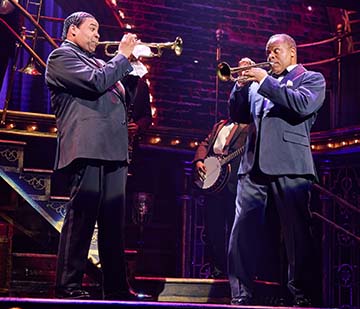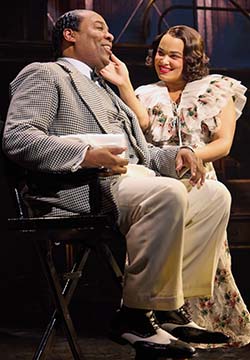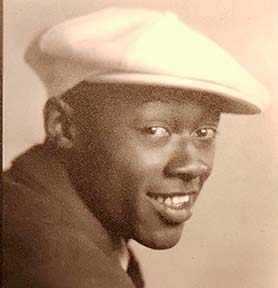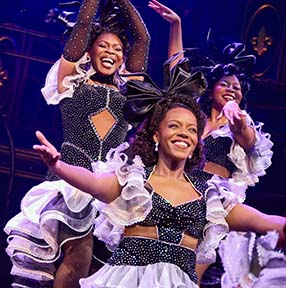By Lucy Komisar
Louis Armstrong was a sublime performer. This play is a great recreation of his music with terrific dancing, but it’s more vaudeville show than drama. It shifts quickly through his career as a black artist. Some interesting stuff about dealing with gangsters and Hollywood racism but too much about his four wives. Best is James Monroe Iglehart as Armstrong who has brilliantly copied his gravelly voice.
Most of his biography moves from New Orleans to Chicago to Hollywood to New York tied to his marrying and ditching ladies along the way. If this is decade #x this must be place #y and wife #z. Anything about why he married or left any of the ladies? Did he ever care about any of them? Not that we can see, because he left them readily when career beckoned.
The brilliant jazz singing and jazz dancing starts in New Orleans where musicians play in bordellos. King Joe Oliver (Gavin Gregory) is a trumpet player, Daisy (Dionne Figgins), who Armstrong will marry, is a prostitute. Fine performers. He plays Dixieland on a riverboat. That gets cut short with racist threats that lead, it is suggested, to a band member being lynched.
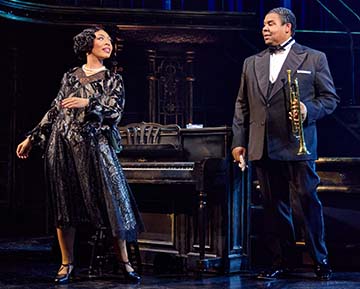
His comment on racism is a memorable song, “So black and blue.” And he goes to Chicago, without Daisy.
The next woman is Lillian Hardin (Jennie Harney-Fleming), a classically trained pianist who instructs him about life. And the swinging sound, “Don’t mean a thing if it ain’t got that swing.” She insists she will be his biz manager-collaborator-wife. A jazzy romance.
Complications by the white music world arrive. Joe Glaser (Jimmy Smagula) wants to be his manager. And there’s some mafia in the background. Glaser managed him for 40 years and was a major factor in his success, not mentioned in the play.
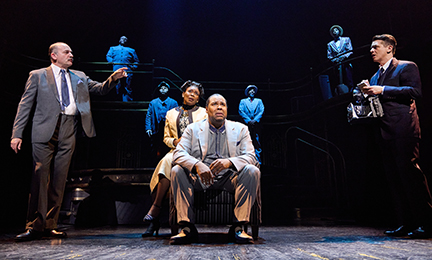
There is a problem with southern racism, he gets arrested in Memphis. And in a surreal curiosity, he does a benefit show for the Memphis police, with an ironic “I’ll be glad when you’re dead, you rascal you!”
Then he goes to Hollywood, leaving behind wife Lillian, who wants to stay on the road.
Alfa Smith (Kim Exum) marriage #3, sharpens the music with skat. At this point you wonder if Armstrong’s life is just about his switching women when he finds one who advances his career.
In Hollywood, more racism. He and Alfa aren’t invited to an event at the famous Brown Derby. Exum is a charmer with a voice that echoes in “Butter and egg man” and vibrates “When you’re smiling…”
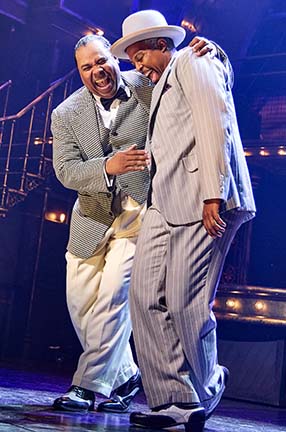
For me the most interesting part, which probably most viewers didn’t understand, was the bit with Lincoln Perry (Dewitt Fleming Jr).
Perry was born in Key West of Jamaican and Bahamian descent, made about 50 films, and is considered the first successful black film actor. He played “Uncle Tom” characters though now is called a “trickster.” That story is not told.
He and Armstrong do a terrific tap dance. He advises Amstrong, “Take their money.”
After more gangster threats, Armstrong departs for New York, to make it big in the sophisticated Cotton Club. Alfa leaves with his driver. Again, what kind of relationships did Armstrong have with these talented women?
In New York he taps Lucille Wilson (Darleasia Cearcy), the best torch singer at the Cotton Club, for the next Mrs. A.
I just saw a film “Soundtrack to a Coup D’etat,” written and directed by Belgian filmmaker Johan Grimonprez, about the U.S. organized murder of Congo prime minister Patrice Lumumba. It tells how the U.S. sponsored Armstrong and other black jazz greats as cultural ambassadors, “unknowing decoys in the CIA’s plot” to assassinate Lumumba. When Armstrong realized that he was a being used to cover up America’s malign attack on that country’s democracy, he considered giving up his citizenship. None of that is mentioned in the play.
Terrific music and dance. Disappointing as a biography, though I suppose you can’t expect Broadway to more directly criticize an entertainment icon for sexism — though it must be apparent to most viewers — or the U.S. for its murderous imperialist policies.
“A Wonderful World: The Louis Armstrong Musical.” Book by Aurin Squire. Directed by Christopher Renshaw. Choreographed by Rickey Tripp. Studio 54, 254 W 54th St., NYC. 2hrs 40min. Opened Nov 11, 2024.


